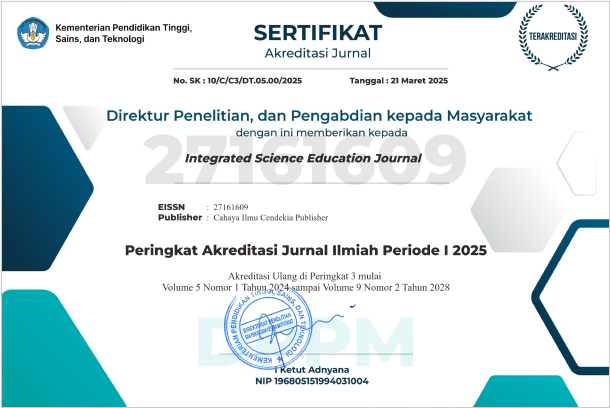Integrating Scientific Attitude to Realize Pancasila Learner Profile in Science Learning
Abstract
Purpose of the study: Investigate the integration of scientific attitudes in Natural Science learning and its impact on the character development of Pancasila Students. With the increasing need to form a generation that is not only academically intelligent but also has a strong character, this study focuses on how scientific attitudes can be integrated into the science curriculum to support Pancasila values.
Methodology: This study used a literature review approach by analyzing 40 relevant articles and studies published between 2014 and 2024. Data were collected through searches in academic databases, and qualitative analysis was conducted to identify key themes related to integrating scientific attitudes and character.
Main Findings: This study found that integrating scientific attitudes in Natural Science learning is very important to shape students' characters under Pancasila values. Effective learning models, such as project-based learning and group discussions, can increase student engagement and understanding of science concepts and encourage positive behaviors such as tolerance and cooperation. These findings align with previous studies showing active and collaborative learning approaches can increase student engagement.
Novelty/Originality of this study: The holistic approach that combines scientific attitudes and the character of Pancasila Students in Indonesia's education context. The results of this study provide important implications for educators and policymakers to adopt a learning model that integrates scientific attitudes and character education in the curriculum. Thus, this study contributes to the development of better educational practices relevant to the needs of the times and prepares students to become responsible and ethical individuals in society.
References
K. Sutarmi and M. Suarjana, “Peningkatan hasil belajar siswa menggunakan metode problem solving dalam pembelajaran IPA,” Jurnal Ilmiah Sekolah Dasar, vol. 1, no. 2, pp. 75-82, 2017, doi: 10.23887/jisd.v1i2.10141.
E. Junitasari and A. Heryanto, “Pengaruh media konkret terhadap hasil belajar ipa pada materi perubahan wujud benda kelas V di Sekolah Dasar,” NUSRA: Jurnal Penelitian dan Ilmu Pendidikan, vol. 5, no. 3, 2024, doi: 10.55681/nusra.v5i3.3143.
D. Widyastika and N. Wahyuni, “Pengembangan penilaian sikap ilmiah berbasis inkuiri berorientasi pendidikan karakter siswa pada pelajaran ipa di Sekolah Dasar,” Jurnal Basicedu, vol. 6, no. 6, pp. 9402–9409, 2022, doi: 10.31004/basicedu.v6i6.4087.
I. Magdalena, D. Meliana Sari, M. Hurrahmah, and N. Refiana Sari, “Pengembangan instrumen penilaian sikap ilmiah pada pembelajaran dengan model latihan penelitian di SDN Rawakidang,” Edisi, vol. 2, no. 3, pp. 350-359, 2020, doi: 10.17509/pedadidaktika.v3i2.5152.
F. N. Kumala, “Analisis profil pelajar pancasila berdasarkan aspek sikap ilmiah pada pembelajaran IPA di sekolah dasar,” Jurnal Moral Kemasyarakatan, vol. 8, no. 1, pp. 84–96, 2023, doi: 10.21067/jmk.v8i1.8396.
N. Munawaroh, C. Mutiara Sanita Putri Widuri, dan A. Rahmat, “Implementasi Pendidikan Karakter Melalui Profil Pelajar Pancasila Rahmatan Lil ’Alamin Pada Siswa Kelas X,” JICN: Jurnal Intelek dan Cendikiawan Nusantara, vol. 3, no. 1, 2023, doi: 10.51878/cendekia.v3i1.1950.
S. Karacalli, and F. Korur, “The effects of project‐based learning on students' academic achievement, attitude, and retention of knowledge: The subject of “electricity in our lives”,” School science and mathematics, vol. 114, no. 5, pp. 224-235, 2014, doi: 10.1111/ssm.12071.
A. Asmarani and I. Idrus, “Peningkatan Sikap Ilmiah Siswa Melalui Penerapan Model Discovery Learning,” Jurnal Pendidikan dan Pembelajaran Biologi, vol. 1, no. 1, pp. 16–22, 2017, doi: 10.33369/diklabio.1.1.15-21.
Y. Yunita, S. Irawati, and I. Idrus, “Peningkatan Sikap Ilmiah Peserta Didik Melalui Penerapan Model Discovery Learning,” Diklabio: Jurnal Pendidikan dan Pembelajaran Biologi, vol. 3, no. 2, pp. 250–257, 2019, doi: 10.33369/diklabio.3.2.250-257.
N. Budiyanti and R. Diah Utami, “Meningkatkan kemampuan bernalar kritis melalui model pembelajaran project based learning berbantuan media digital,” Edu Research, no. 5, no. 1, pp. 109-120, 2024, doi: 10.47827/jer.v5i1.161.
P. Y. Liou, “Students’ attitudes toward science and science achievement: An analysis of the differential effects of science instructional practices,” Journal of Research in Science Teaching, vol. 58, no. 3, pp. 310-334, 2021, doi: 10.1002/bmb.21574.
I. V. Rossi, J. D. de Lima, B. Sabatke, M. A. F. Nunes, G. E. Ramirez, and M. I. Ramirez, “Active learning tools improve the learning outcomes, scientific attitude, and critical thinking in higher education: Experiences in an online course during the COVID‐19 pandemic,” Biochemistry and Molecular Biology Education, vol. 49, no. 6, pp. 888-903, 2021, doi: 10.1002/bmb.21574.
M. Yusuf and A. Andariana, "Pengukuran sikap ilmiah mahasiswa pada materi pengaruh aspek geografis terhadap sebaran hewan,” LaGeografia, vol. 20, no. 3, p. 281, 2022, doi: 10.35580/lageografia.v20i3.33280.
N. E. Tamara, N. Ulfatin, A. Imron, and A. Timan, “Ekstrakurikuler islamic centre sebagai wahana integrasi pembiasaan sikap ilmiah dan bina taqwa peserta didik di SMA Umum,” JAMP: Jurnal Administrasi dan Manajemen Pendidikan, vol. 7, pp. 1–16, 2024, doi: 10.37471/jpm.v7i1.361.
I. A. Alessa, and S. Hussein, “Using traditional and modern teaching methods on the teaching process from teachers’own perspective,” Journal Route Educational & Social Science JournalRoute, vol. 10, no. 2, pp. 65-92, 2023, doi: 10.17121/ressjournal.3361.
L. Chen, and S. Xiao, “Perceptions, challenges and coping strategies of science teachers in teaching socioscientific issues: A systematic review,” Educational Research Review, vol. 32, pp. 100377, 2021, doi: 10.1016/j.edurev.2020.100377.
C. Indriani et al., “Peningkatan Sikap Ilmiah Peserta Didik Melalui Model Discovery Learning Pada Materi Sistem Pernapasan Manusia,” Didaktika Biologi: Jurnal Penelitian Pendidikan Biologi, vol. 7, no. 1, pp. 1–7, 2023, doi: 10.32502/dikbio.v7i1.4479.
E. Yilmaz, and F. Korur, “The effects of an online teaching material integrated methods on students’ science achievement, attitude and retention,” International Journal of Technology in Education, vol. 4, no. 1, pp. 22-45, 2021, doi: 10.46328/ijte.79.
H. Harjali, I. N. S. Degeng, P. Setyosari, and W. D. Dwiyogo, “Strategi guru dalam membangun lingkungan belajar yang kondusif: studi fenomenologi pada kelas-kelas sekolah menengah pertama di Ponorogo,” Jurnal Pendidikan dan Pembelajaran (JPP), vol. 23, no. 1, pp. 10-19, 2017, doi: 10.21067/jer.v12i2.10147.
A. Arianti, “Urgensi lingkungan belajar yang kondusif dalam mendorong siswa belajar aktif,” Didaktika: Jurnal Kependidikan, vol. 11, no. 1, pp. 41-62, 2019, doi: 10.30863/didaktika.v11i1.161.
T. R. Pratiwi and D. Muslim, “Pembelajaran IPA terpadu tipe integrated konsep perubahan untuk meningkatkan sikap ilmiah siswa SMP,” Prosiding Simposium Nasional Inovasi dan Pembelajaran Sains 2015 (SNIPS 2015), doi: 10.17509/snips.v1i1.5460.
M. R. Mahaputra and M. Ridho Mahaputra, “Literature review faktor faktor yang mempengaruhi berpikir positif,” Jurnal Ilmu Multidisplin, vol. 1, no. 1, pp. 33-40, 2022, doi: 10.38035/jim.v1i1.
S. K. Putri and Y. Gumala, “Pengaruh model pembelajaran guided inquiry terhadap sikap ilmiah siswa sekolah dasar,” Jurnal Basicedu, vol. 7, no. 5, pp. 2993–3003, 2023, doi: 10.31004/basicedu.v7i5.5963.
A. Purwanto, D. H. Putri, and D. Hamdani, “Penerapan project based learning model untuk meningkatkan sikap ilmiah mahasiswa dalam rangka menghadapi era merdeka belajar”, Jurnal Kumparan Fisika, vol. 4, no. 1, pp. 25–34, 2021, doi: 10.33369/Jkf.4.1.25-34.
E. Rizkasari, “Profil pelajar Pancasila sebagai upaya menyiapkan generasi emas Indonesia,” Jurnal Ilmiah Pendidikan Dasar, vol. 10, no. 1, p. 50, 2023, doi: 10.30659/pendas.10.1.50-60.
M. R. Masdul, H. Pajarianto, R. Rajindra, J. Ahmad, K. Kuliawati, and R. Rahmawati, “Acculturation of religious values in early childhood: Central Sulawesi Educational Institutions,” South African Journal of Childhood Education, vol. 14, no. 1, pp. 1-7, 2024, doi: 10.4102/sajce.v14i1.1530.
S. Farwati, M. Iskhak, and N. Mahnun, “Integrating pancasila in character education: A qualitative analysis of ethical values for Nation-Building,” HEUTAGOGIA: Journal of Islamic Education, vol. 3, no. 2, pp. 211-223, 2023, doi: 10.14421/hjie.2023.32-06.
R. E. Ratnawati, Y. H. Christiani, and A. Karim, “Optimization of character education in the independent curriculum through the Pancasila student profile strengthening project approach,” IJESS International Journal of Education and Social Science, vol. 5, no. 1, pp. 16-30, 2024, doi: 10.56371/ijess.v5i1.235.
Copyright (c) 2025 Wihda Tul Ummah, Yohamintin Yohamintin

This work is licensed under a Creative Commons Attribution 4.0 International License.
Authors who publish with this journal agree to the following terms:
- Authors retain copyright and acknowledge that the Integrated Science Education Journal is the first publisher licensed under a Creative Commons Attribution 4.0 International License.
- Authors are able to enter into separate, additional contractual arrangements for the non-exclusive distribution of the journal's published version of the work (e.g., post it to an institutional repository or publish it in a book), with an acknowledgment of its initial publication in this journal.
- Authors are permitted and encouraged to post their work online (e.g., in institutional repositories or on their website) prior to and during the submission process, as it can lead to productive exchanges and earlier and greater citation of published work.







.png)
.png)






